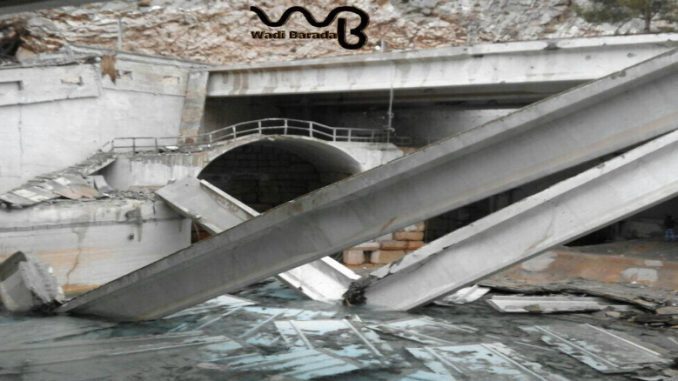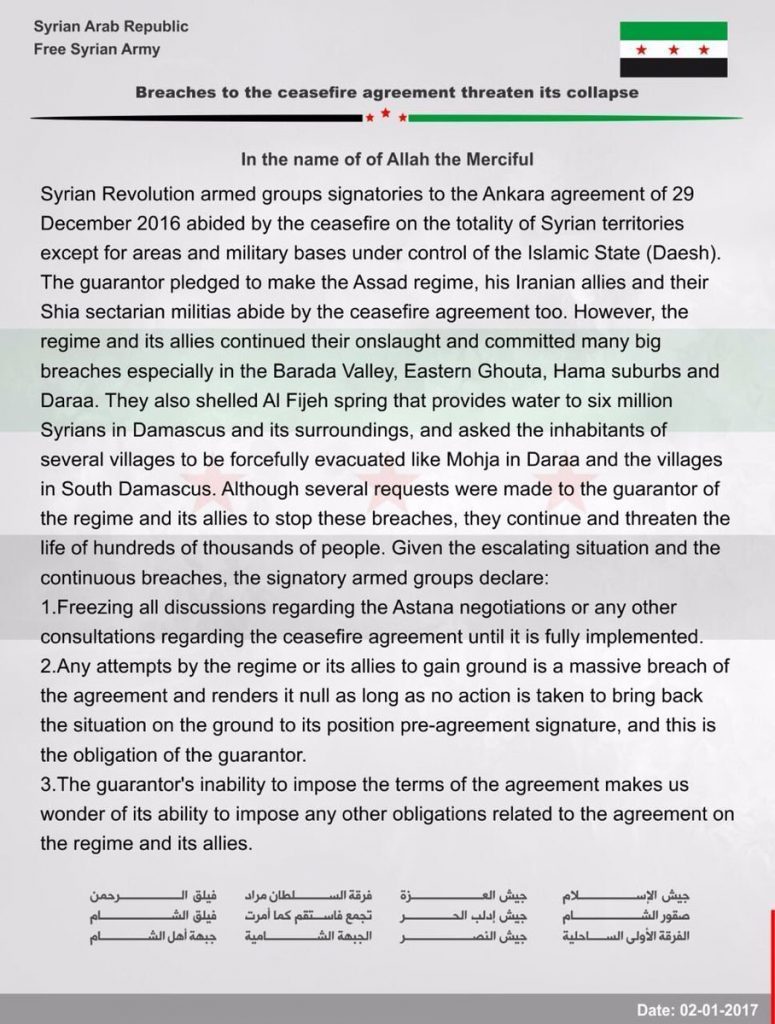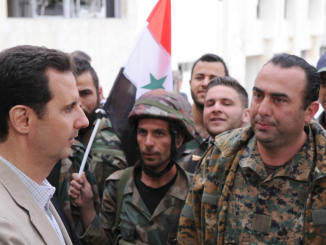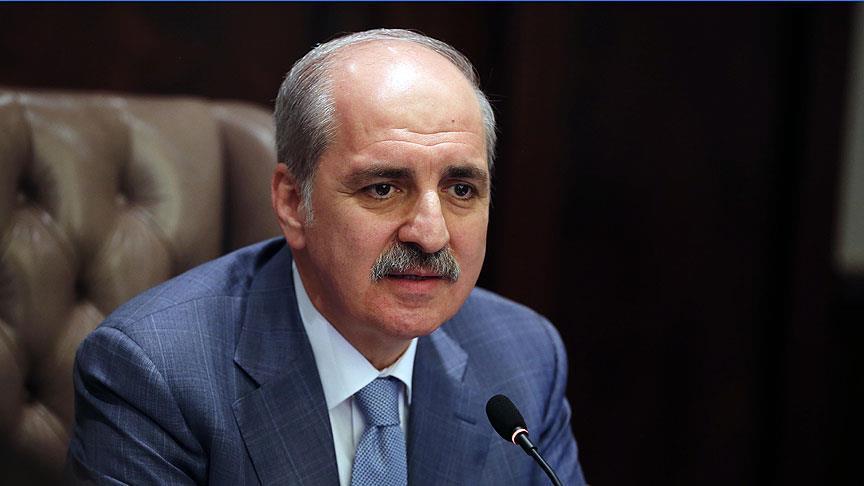
Syrian rebel factions said they are freezing any participation in the peace talks, which are brokered by Russia, Iran, and Turkey and aim at finding a political solution to the Syrian crisis, due to repeated violations of the truce by Assad regime and allied militias.
Russian President Vladimir Putin said that that Syrian opposition groups and the Syrian government had signed a number of documents including a ceasefire deal that will be guaranteed by Turkey and Russia.
The documents include a ceasefire agreement between the Syrian government and the opposition, measures to monitor the ceasefire deal and a statement on the readiness to start peace talks to settle the Syrian crisis, Putin said.
Moscow has said they would take place in Kazakhstan.
The truce, which is the third announced this year, came into effect at midnight on Thursday and follows the evacuation of Aleppo and the city’s surrender to forces loyal to Bashar al-Assad. It covers all areas of the country except those under Islamic State control.
Putin said the agreement was fragile and requires observations due to many previous failed ones.
“The agreements reached are, no doubt, very fragile and they demand special attention and follow-up in order to keep them and develop them. Nevertheless, this is a notable result of our joint work, efforts by the defence and foreign ministries, our partners in the regions,” Putin said.
However, Putin didn’t do any effort to make this agreement successful, as clashes and airstrikes persisted in some areas since the ceasefire began.
The rebels freeze the ceasefire negotiations
In a statement, the rebel groups said they are freezing their participation in the peace talks due to the repeated violations of the truce by Assad regime and its allied militias.
They also said that any territorial advances by the army and Iran-backed militias that are fighting alongside it would end the fragile ceasefire.
The statement said the main violations were in an area northwest of Damascus in the rebel-held Wadi Barada valley, where government forces and the Iran-backed Lebanese Hezbollah group have been trying to press advances in an ongoing campaign.
The groups suspending their participation included the Free Syrian Army, one of the biggest coalitions fighting against President Bashar al-Assad, and the Army of Conquest, another coalition of anti-government groups.
“The regime and its allies have continued firing and committed many and large violations,” said the statement.
“As these violations are continuing, the rebel factions announce … the freezing of all discussion linked to the Astana negotiations.”
“The regime and its allies have not stopped shooting and have launched major and frequent violations, notably in the regions of Wadi Barada and Eastern Ghouta.
“Any [advance] on the ground goes against the [ceasefire] agreement and if things don’t return to how they were before, the accord will be considered null and void,” the statement added.
The rebels have previously said it appeared the government and the opposition had signed two different versions of the ceasefire deal, one of which was missing “a number of key and essential points that are non-negotiable”, but did not say what those were. Syria
Wadi Barada siege
Assad regime forces backed by Hezbollah and Shia militias have launched the attack on Wadi Barada valley since two weeks, with daily bombing and air raids on the area.
Rebels say the army is seeking to recapture the area, where a major spring provides most of Damascus’s water supplies and which lies on a major supply route from Lebanon to the Syrian capital used by Hezbollah.
The Assad regime forces said some 1,300 people fled the Barada Valley region on Saturday and Sunday. They also said those fleeing Barada Valley were relocated to safer areas and their names were registered by the Syrian Arab Red Crescent.
The government assault has coincided with a severe water shortage in Damascus since December 22. Images from the valley’s Media Center indicate its Ain al-Fijeh spring and water processing facility have been destroyed in air strikes. The government says rebels spoiled the water source with diesel fuel, forcing it to cut supplies to the capital.
Wadi Barada has been surrounded by government forces since mid-2015, but the siege was tightened in late December as the army piled on pressure seeking to secure a “reconciliation” deal.
It has won several of these deals in opposition areas around the capital, offering safe passage to surrendering rebels in return for retaking territory.
The opposition criticizes them as a “starve or surrender” tactic.
And with the continued military operations in Wadi Barada, the regime authorities continue cutting off the water of the capital Damascus for the 11th day in a row, after they closed the pipelines that feed the capital and coming from Ein al-Fijah in Wadi Barada.
#وادي_بردى
Video from Assads media shows how the Assad regime forces targeted civilian homes #WadiBaradahttps://t.co/zYuC8Vmxfz— وادي بردى (@w_barada) January 3, 2017
#وادي_بردى #Wadibarada
فيديو يوضح حجم الدمار الهائل في منشأة نبع #عين_الفيجة الذي يغذي #دمشق و ما حولها بمياه الشربhttps://t.co/m4nsLkKPeA— وادي بردى (@w_barada) December 27, 2016
The Syrian crisis began as a peaceful demonstration against the injustice in Syria. Assad regime used to fire power and violence against the civilians and led to armed resistance. 450.000 Syrians lost their lives in the past five years according to UN estimates, and more than 12 million have lost their homes.




